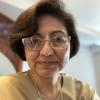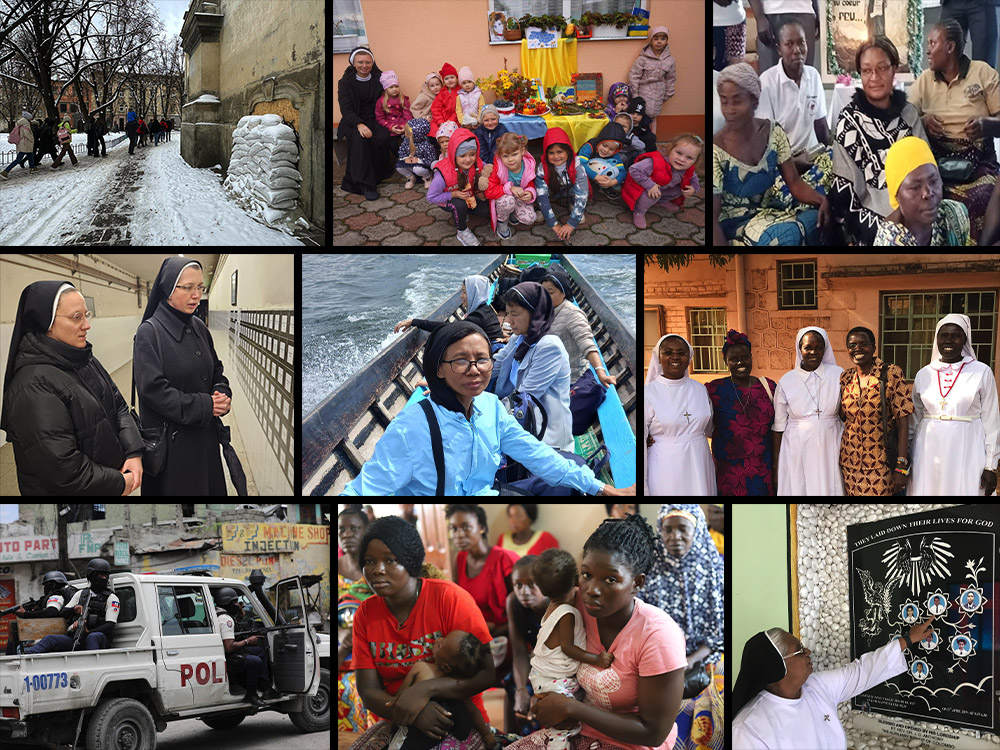
From left, top row: Lviv, Ukraine (Gregg Brekke); Perechyn, Ukraine (Courtesy of Sisters of the Order of St. Basil the Great); Kiwanja, Rutshuru, Democratic Republic of Congo (Stephano Kambale).
Middle row: Vukovar, Croatia (GSR Photo/Chris Herlinger); Myanmar (Courtesy of Sister Florence); South Sudan (Courtesy of Scholasticah Nganda).
Bottom row: Port-au-Prince, Haiti (OSV News/Reuters/Ralph Tedy Erol); Makeni, Sierra Leone (GSR photo/Doreen Ajiambo); Negombo, Sri Lanka (Thomas Scaria).

When the staff and colleagues of Global Sisters Report met in December 2022 to decide what we were going to focus on as our major series or signature project in 2023, it quickly became clear that one issue dominated all the others: war and armed conflict. Catholic sisters increasingly were serving — or trying to serve — people in areas ripped apart and terrorized by invading armies or armed gangs or both.
How did sisters manage to do this? What were their thoughts and feelings? How did they keep up their spiritual strength and courage amid such fraught and often dangerous circumstances?
Publishing a series of stories about sisters, and columns written by sisters in such regions, has been the most ambitious and challenging project we have undertaken at Global Sisters Report. We are a very small staff and lack the resources of larger media organizations. Yet we knew this was the subject we needed to focus on.
We sent a team — international correspondent Chris Herlinger and freelance photojournalist Gregg Brekke — to Ukraine to report on the efforts by sisters there to aid those affected by the war and their own reactions to their homeland being so brutally assaulted. We published the first story — and the first of several columns by sisters in Ukraine — on Feb. 23, the eve of the one-year anniversary of Russia's invasion.
That launched our yearlong series, Hope Amid Turmoil: Sisters in Conflict Areas.
Since then, we have published stories and columns about or by sisters in Sudan, Nigeria, Myanmar, South Sudan, Nicaragua, Haiti, Chad and Congo, among other places. We've also focused on efforts by sisters to help foster peace and reconciliation in Sri Lanka and Sierra Leone, countries once beset by war, strife and acts of terrorism, but now seeking to live peacefully.
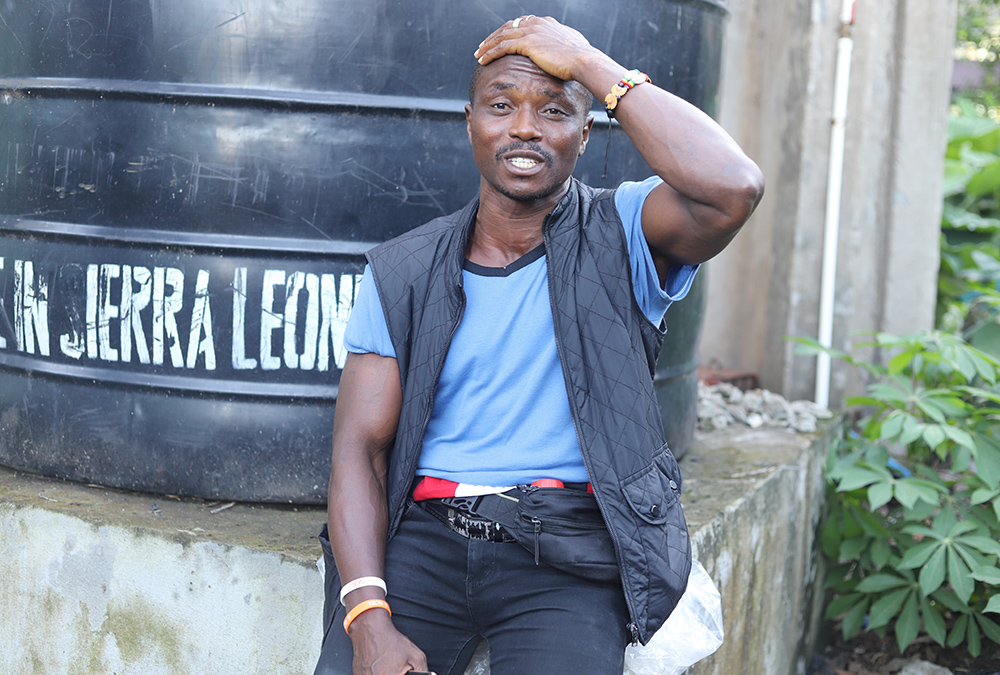
Amara Sahr Kemba, 40, a former child soldier, narrates how he used to kill people under the orders of rebel commanders during the civil war in Sierra Leone from 1991-2002. He has benefited from religious sisters' peacebuilding program to help survivors and perpetrators recover from the deep hurts and divisions caused by the conflict. (GSR photo/Doreen Ajiambo)
Through these stories and columns, we've been inspired by the incredible courage of these women, and the deep well of faith they draw upon.
This particular series ended in December, though our coverage of sisters in troubled areas of the world will continue. We wanted to take some time to reflect on the Hope Amid Turmoil series, so Gail DeGeorge, as the editor of Global Sisters Report, engaged Chris Herlinger, GSR's international correspondent; Presentation Sr. Joyce Meyer, international liaison to women religious; and Benedictine Sr. Helga Leija, editor for sister columnists, in a conversational question-and-answer session about the experience with the project and the insights it inspired.
Gail: Chris, reflecting on your reporting trip to Ukraine now almost a year ago, can you share some of your overall observations and memories? How were the sisters ministering to others amid a war and what were they engaged in doing?
Chris: Some congregations at that time were still hosting refugees at convents and congregational housing, though some of those numbers had declined with refugees either going elsewhere or even returning to Ukraine.
I was happy to continue to keep in touch with one refugee woman, Svitlana Kruchynska, being hosted in Krakow, Poland, by a group of Dominican sisters. I first met her during my initial reporting trip to Poland in March 2022 and saw her in subsequent visits in late 2022 and early in 2023. She's still in Krakow, doing well but missing home.
Some sisters were still going near the front and delivering humanitarian supplies like food and medical supplies. One of those was Sr. Lydia Timkova, whose story and example I think were particularly inspiring because she was fearless in traveling close to the war front to deliver humanitarian assistance. Sister Lydia knows all the risks.
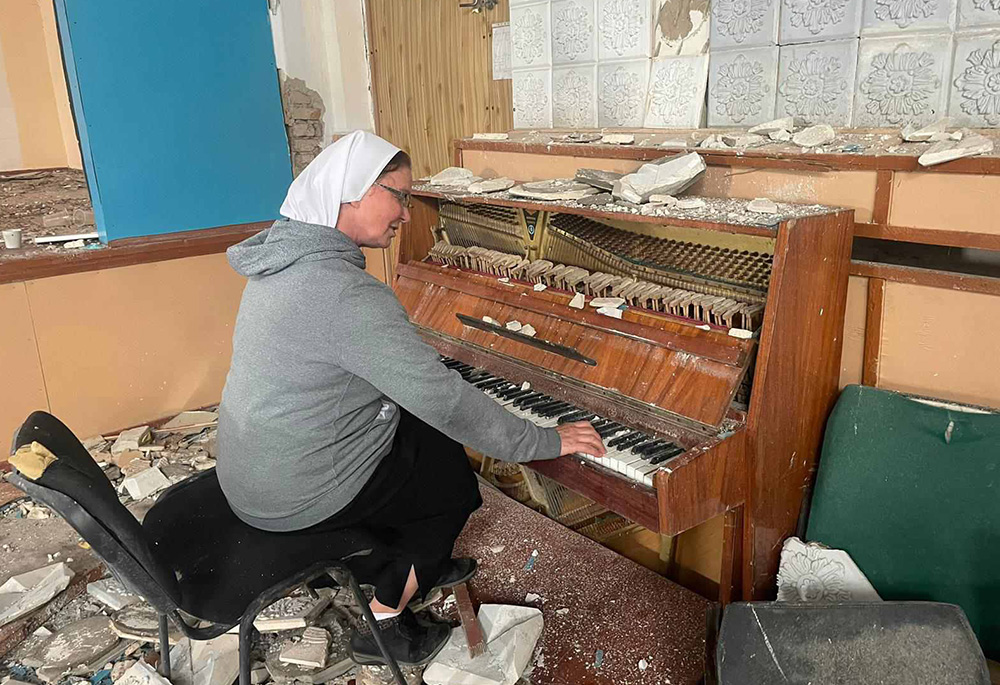
Sr. Lydia Timkova sits down at a piano in destroyed property in a village near Mykolaiv, eastern Ukraine. (Courtesy of Lydia Timkova)
As I noted in the story, she says she has witnessed "destroyed houses, roads, cars, and worst of all, destroyed lives." She adds: "It is always like a sword that pierces my heart, and it cries bloody tears."
Aside from these and other examples, I think some of the most important work by sisters was that of witnessing and just being "present" with those experiencing war.
Gail: Sister Joyce, you tapped some of your many contacts to find sisters to write for us from war-torn countries. What were some of the most difficult countries to find sisters to write from, and what surprised you in that process?
Joyce: Cameroon, the Democratic Republic of Congo, Chad, Ethiopia and the Holy Land were among the most challenging. It wasn't so much a surprise, but rather a wondering that sisters did not talk about the impact on themselves ministering to others in their suffering. And yet, the physical needs are so much more apparent than the psychological or spiritual.
The Chad column by Sr. Juliette N'guémta Nakoye Mannta notes that there was trauma that was physical, psychological and spiritual, but does not say anything about how these were coped with except by faith.
Another particularly insightful column was by Sr. Rose Namulisa Balaluka from the Democratic Republic of Congo. The sisters can see the suffering and they continue to do what they can to alleviate it, all done with a deep sense of spiritual faith. This community found comfort in being together in prayer and faith sharing.
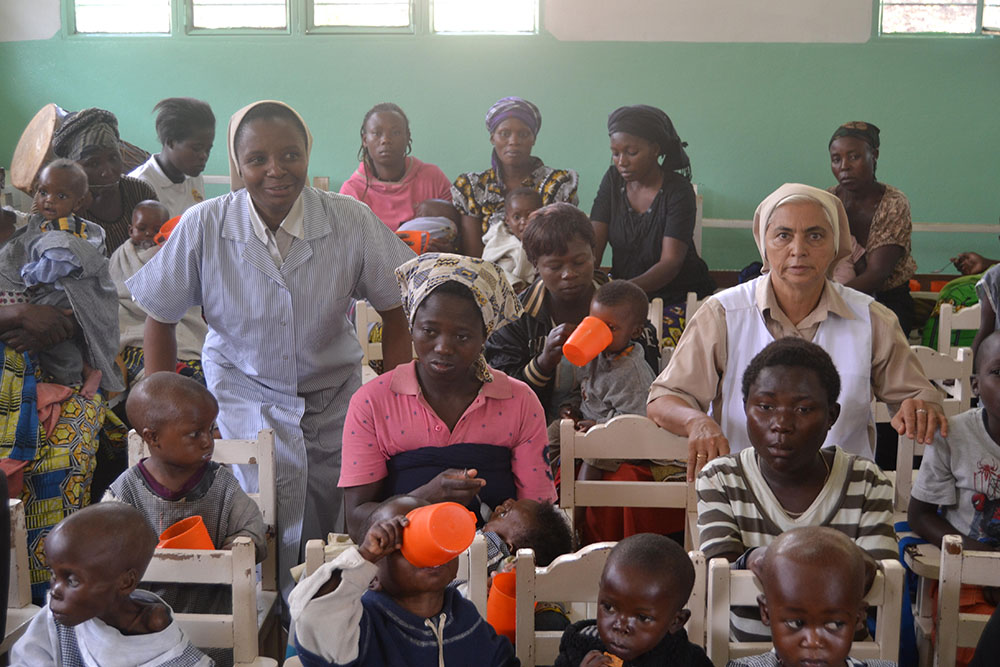
Daughters of the Resurrection in the waiting room of one of their clinics in the Democratic Republic of Congo (Courtesy of Rose Namulisa Balaluka)
I do wonder if coping is a kind of compartmentalizing that needs to take place. That is what I experienced personally from an event of trauma when I was a missionary in Zambia. It did not surface until some years later, once the context was no longer there.
Gail: Sister Helga, you edited columns from sisters in war-torn areas, and in other places of conflict and unrest that don't garner as many headlines, such as Nicaragua. Can you share the impressions and insights you gained in doing so?
Helga: I have found it is very difficult for sisters to speak about what is happening. There is fear of retaliation, and because of that some sisters have chosen to use a pseudonym. Getting some sisters to write a column was a long process of earning their trust assuring them that their names will not be revealed. It must be very difficult to live in such fear.
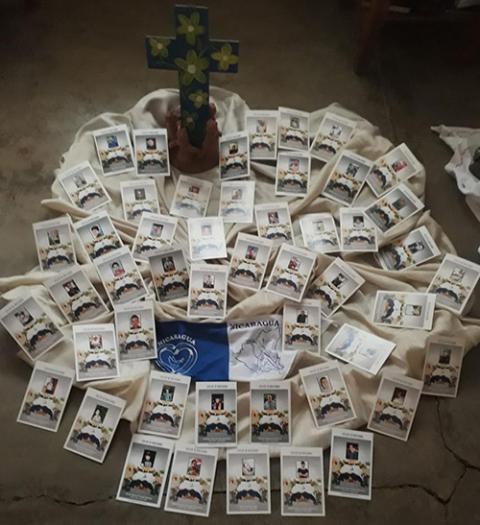
Postcards designed by the Museum of Memory against Impunity together with the Association of Mothers of April demand justice for the victims of April 2018, when protesters were killed by government forces in Nicaragua. (Courtesy of Flying in V Formation)
Another thing I noticed was that when writing, sisters don't speak about their personal suffering, but more about how the conflict affects those around them. There are two columnists who wrote columns in the form of prayers, one from Cuba and one from Nicaragua, as pleas to God to help with the situation.
Gail: Chris, you traveled to Ukraine in the beginning of the year and then ended the year in Croatia and Bosnia, two European countries that faced wars 30 years ago. What surprised you in your travels? What were the common threads in those locales?
Chris: It wasn't a surprise, but the three countries, though different in many ways culturally and religiously, felt similar in crucial ways — topography, for example — and also in the fact that the countries had all experienced the extreme trauma of World War II before the contemporary wars — the 1990s wars in Bosnia and Croatia and the current war in Ukraine.
I have visited a lot of memorial sites in Central and Eastern Europe in the last two years — sites of battles and massacres and genocide — and I don't think you can ever underplay how that history hovers in the background for all of these places.
I wasn't surprised, either, by stories of courage and resolve by sisters. One sister I met in Bosnia told me that during the worst of the war there, she was told by the U.S. ambassador at the time that it might be best for her to evacuate — she is Croatian but had lived for a time in New York City doing ministry and had acquired U.S. citizenship. The sister, a quietly formidable woman like many sisters, politely but firmly told the diplomat, "Mr. Ambassador, I'm a nun. I'm not abandoning my people here." Great story — and I'm not surprised by it!
Advertisement
Maybe one surprise during the recent assignment was that the very kind sister in Zagreb, Croatia, who essentially set up my travel itinerary told me that sisters might be a bit reluctant to talk about their war experiences. But that wasn't the case at all. I got the impression that the sisters were actually very eager to reflect on their experiences and talk about them. They actually warmed to it. Maybe it's just that no one — or at least an outsider — had asked the question.
As for lessons learned, and what sisters in current or future conflict zones can learn, the sisters all said it's important to meet "people where they are" and stay with them, don't abandon them. That may seem obvious, but like the story I told about the sister who stayed in Bosnia, not always an easy thing to do!
Gail: Any other thoughts on what you see as common themes the series addressed? What insights and inspirations did you draw from the stories and columns?
Chris: That sisters have such fortitude and courage — that includes physical courage in many cases. And that the extremes of war can help foster a deeper spirituality. They manage their own trauma with the deep wellsprings of prayer. Without faith, they say, it would be much tougher to face these situations.
Helga: There is one column that comes to mind from Sr. Irena Saszko in Ukraine, where the Institute of Theological Sciences of the Immaculate Virgin Mary in Ukraine organized a joint retreat for sisters of both Eastern and Western rites. Sister Irena mentions in her column how many sisters confessed that they found it difficult to pray and trust God because of the suffering caused by the war. And so, experiencing a retreat, designed for healing and unity, was truly beautiful and necessary.
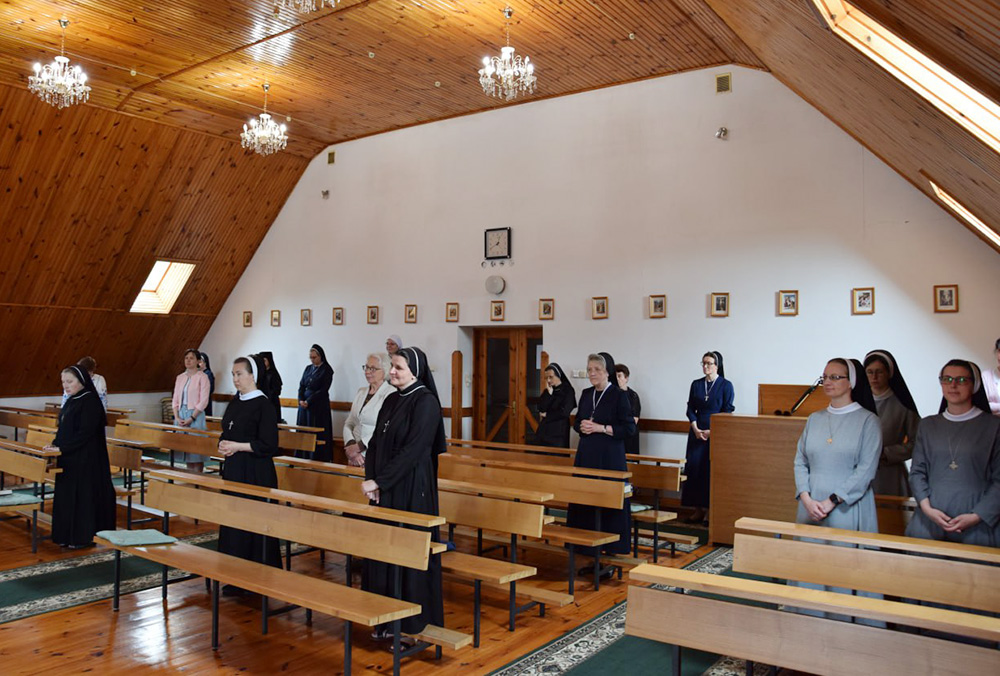
During a retreat held June 9-17, 2023, sisters participate in the Eucharist in the chapel of the Institute of Theological Sciences of the Immaculate Virgin Mary in Horodok, Ukraine. (Courtesy of Irena Saszko)

